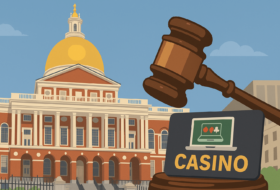
Pennsylvania gamblers in the Shippensburg area have more waiting to do before they get their local retail gaming location. Parx is in the midst of a $65 million project to transform what used to be a Lowe’s Home Supply store into a mini-casino. However, it has just pushed back its expected opening date for a second time.
The project has been in the works since 2018. Parx Casino parent Greenwood Gaming & Entertainment won an auction for a Category 4 casino license with a bid of $8.11 million. In January 2022, it received approval to begin construction from the Pennsylvania Gaming Control Board (PGCB).
The 73,000-square-foot Parx Casino Shippensburg will feature 500 slot machines, 48 electronic table games, and a 100-seat sportsbook. Non-gaming amenities will include a restaurant and a sports bar. In total, the company expects to employ 125 full-time workers.
Prior to the latest news, Greenwood expected to begin accepting patrons at the new location by the end of 2022. However, citing supply chain disruptions, the company has now said that the property will not open its doors until early next year.
What are Pennsylvania Mini-Casinos?
What exactly is a mini-casino? The obvious answer is that it’s like a regular casino, only smaller. However, they aren’t actually all that small.
The Pennsylvania legislature introduced the idea of mini-casinos in 2017. It appeared alongside efforts to expand the scope of gambling in the state in other ways, primarily by legalizing sports betting. Mini-casinos’ purpose was to provide options for players not located near the state’s existing gaming properties without authorizing new full-sized casinos.
Another proposed benefit of these smaller gaming establishments is to breathe new life into dying malls and shopping centers. Two of the state’s first three mini-casinos took over a vacant retail space. Cordish Companies’ Live! Casino Pittsburgh set up shop in a former Bon-Ton department store, while Penn Entertainment’s Hollywood York took over what used to be a Sears. The use by Parx of the old Lowe’s in Shippen Town Center continues the pattern.
The main limitation of the mini-casinos is that each must be tethered to a Category 2 casino license. These are the full-sized casinos like Parx’s primary location in Bensalem, which is currently the state’s highest-grossing casino. The Category 4 mini-casinos also have a maximum of 750 slot machines and 40 table games, while Category 2 locations have no limit.
Fewer Mini-Casinos Than Anticipated
The mini-casino bill provided for up to 10 mini-casinos throughout the Keystone State. However, few bidders came forward. In the end, the PGCB only awarded five licenses. So far, three have opened:
- Live! Casino Pittsburgh (Nov 2020)
- Hollywood Casino York (Aug 2021)
- Hollywood Casino Morgantown (Dec 2021)
Parx Shippensburg will be the fourth. The final one may be a Bally’s property in a shuttered Macy’s department store at State College’s Nittany Mall, near Penn State University. However, that project is facing legal challenges, so its future is up in the air, and an opening date may be a long way off.
The Impact of Mini-Casinos on PA
With those recent additions, Pennsylvania now boasts:
- 16 casinos
- 18 retail sportsbooks
- 65 truck stops with video gaming terminals
- 19 online casino sites
- 14 online sports betting brands
Across these various gaming platforms, gamblers lost more than $4.7 billion in 2021. That puts Pennsylvania just ahead of New Jersey and behind only Nevada as the second-largest gambling market in the US.
As Pennsylvania’s gambling industry has grown, so has the number of people in the state contending with the threat of problem gambling. In 2022, more Pennsylvanians than ever will put themselves on the state’s voluntary self-exclusion registries.
As Bonus previously reported, this doesn’t necessarily mean that Pennsylvania is in the midst of a problem gambling epidemic. Elizabeth Lanza, Director of the PGCB’s Office of Compulsive and Problem Gambling, described this as a predictable spike that accompanies the launch of new gambling options. The growth in retail self-exclusions will likely settle down in a year or two, though online self-exclusions will grow as long as the market does.





